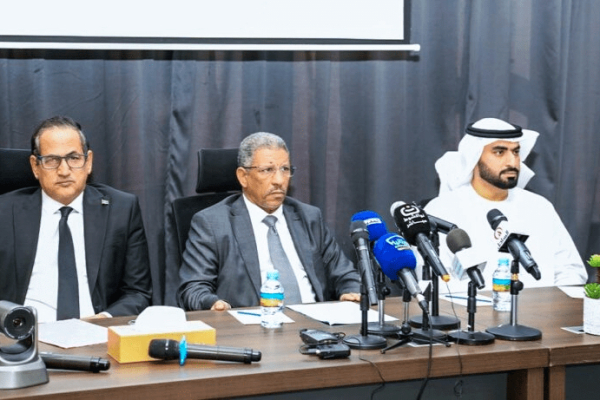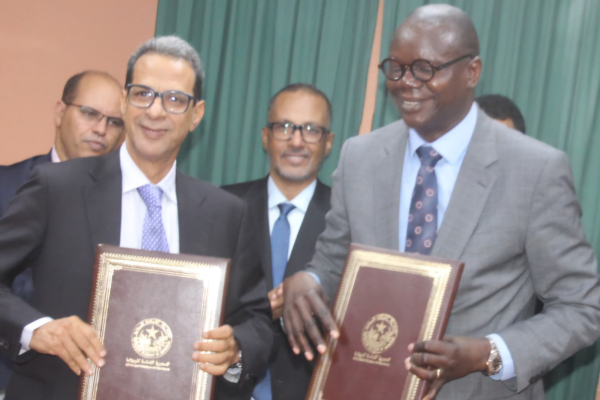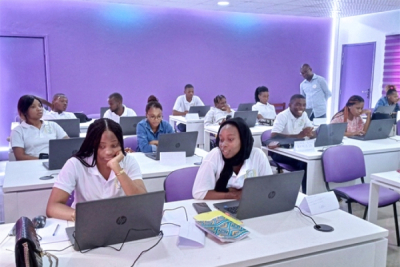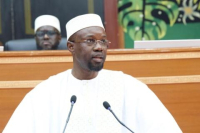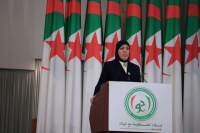
Tech (802)
Digital transformation has become a top priority for education systems across the globe. Countries are modernizing their schools to equip younger generations with the skills and knowledge they need to succeed in the digital age.
Mauritania is advancing its education reform efforts by integrating digital technologies into its system. On January 15, the Ministry of Education and System Reform hosted a workshop that brought together key stakeholders to develop a national roadmap for the digital transformation of education.
According to Yahya Boba Taleb, Secretary General of the Ministry of Education, the workshop aimed to create an education advancement plan with clear milestones for modernizing the sector. The resulting initiatives are expected to lay the groundwork for a sustainable and forward-looking reform tailored to address the country's current challenges.
This initiative aligns with Mauritania's ongoing Digital Transformation Strategy and follows the country's recent participation in the FIFA Foundation's Digital Education Program, marking it as the first African nation to join. The program aims to train 10,000 Mauritanian children aged 6 to 12 over three years in coding, robotics, and digital literacy.
Once finalized, the roadmap will focus on integrating technology into the education system in a cohesive and inclusive manner, with a focus on improving access, quality, and equity in education. It will draw on international best practices to ensure a modernized approach that meets 21st-century demands. Particular attention will be given to rural areas, where students often have limited access to modern educational resources.
By Samira Njoya,
Editing by Sèna D. B. de Sodji
In today's rapidly evolving world of information and communication technologies, regional and international partnerships are crucial for driving inclusive growth, fostering innovation, and enhancing the competitiveness of economies on the global stage.
The Federation of Services of Mauritania and Senegal's Organization of ICT Professionals (OPTIC) signed a memorandum of understanding on Monday, January 13, during Senegalese Prime Minister Ousmane Sonko's official visit to Mauritania. The agreement aims to deepen digital cooperation between the two nations and promote sustainable economic integration.
"This agreement seeks to structure and intensify business partnerships and collaboration between our digital ecosystems to accelerate digital transformation in our countries," said Mbagnick Diop, president of the Senegalese Business Movement.
The partnership underscores a shared commitment to developing the digital private sectors in Mauritania and Senegal. It includes several initiatives such as jointly promoting flagship events and activities in the tech sector, organizing forums and B2B meetings between digital enterprises and other industries seeking digitization, and creating a framework to harmonize public-private dialogue on key issues like human capital, funding, and research and development.
The collaboration is expected to speed up digital transformation in both countries while unlocking new economic and social opportunities. As Senegal positions itself as a tech hub with initiatives like the “New Deal Technologique”, Mauritania is stepping up efforts to modernize its digital infrastructure and administration.
This synergy between the two neighboring nations could serve as a model for other West African partnerships, reinforcing the region’s role in Africa’s burgeoning digital economy. The sector’s value is projected to reach $180 billion by 2025, according to a report by Google and the International Finance Corporation (IFC).
By Samira Njoya,
Editing by Sèna D. B. de Sodji
The Tunisian government views the digitization of services as a key solution to simplify administrative procedures, reduce processing times, and enhance transparency in its interactions with citizens.
Tunisian Transport Minister Rachid Amri confirmed the upcoming launch of a national ride-hailing application on Monday. The minister, speaking on a private radio station, said the domestically developed app aims to provide a high-quality, accessible, and better-regulated transportation service for citizens.
Amri said the app will ensure the availability of taxis, reasonable prices, and quality service. Unlike existing platforms, fares will be capped at 1.5 times the value of the traditional taxi meter to avoid excessive charges that burden citizens.
This announcement comes amid demands from individual taxi drivers for an increase in the current meter rate, which is set at 900 millimes. Drivers are advocating for it to be raised to two dinars ($0.62 USD) to cover the fixed costs of their operations, which have risen significantly in recent years.
Beyond regulating fares and services, this application is fully aligned with the Tunisian government’s goals for digital transformation and public service modernization. Tunisia already stands out as a leader in North Africa and ranks third on the continent for e-government, according to the United Nations’ 2024 E-Government Survey (UN DESA). With a score of 0.6935 out of 1, Tunisia far exceeds the African average of 0.4247, illustrating its progress in digitizing services.
The new platform, set to be operational by the end of the first half of 2025, also aims to highlight local technological expertise while creating a fair framework for drivers and a more accessible system for users. It is expected to improve citizens’ daily lives while strengthening the national digital economy.
By Samira Njoya,
Editing by Sèna D. B. de Sodji
In today's rapidly evolving digital landscape, African countries are modernizing their education systems. Integrating digital technologies is crucial for addressing current educational challenges and creating a more inclusive and accessible learning environment.
Gabon’s Council of Ministers on Sunday approved a draft ordinance aimed at digitizing the country’s education system.
The ordinance seeks to integrate digital technologies and educational platforms into teaching and learning methods, according to a government statement.
"The draft ordinance aims to strengthen the legal and regulatory framework governing the transformation of teaching and learning methods through the integration of digital technologies and educational platforms," the statement said. "This reform is all the more urgent as the COVID-19 health crisis highlighted the need to develop alternatives to in-person teaching."
This decision aligns with the government's ongoing efforts to modernize the education system. In December, the government launched an inter-ministerial partnership to connect schools to the internet.
The anticipated outcomes of the digitization initiative include greater resilience in the education system during crises, reduced inequalities between urban and rural areas, and the modernization of teaching practices. The reform is also expected to help train a skilled workforce to support the country's economic transformation.
Samira Njoya
After being absent from the global Startup Ranking in 2020, Algeria has now surged into the top 20 countries with the highest concentration of young tech entrepreneurs. In Africa, the nation ranks second, trailing only Nigeria.
The Algerian government is continuing to bolster digital innovation with new fiscal incentives introduced for 2025, building on a series of measures implemented over the past five years. These include exemptions from transfer duties on property acquisitions for startups and incubators to stimulate industrial activity, as well as a two-year extension of income tax (IRG) and corporate tax exemptions for incubators, contingent on the renewal of their official designation.
The government has also introduced exemptions from registration fees for the incorporation of companies led by holders of the "innovative projects" label. To encourage research and development (R&D), the 2025 Finance Act introduces tax deductions for expenses related to in-house R&D and open innovation programs contracted with startups or incubators.
"This deduction, applicable to the determination of taxable profit, is limited to 30% of the accounting profit, with a maximum cap of 200,000,000 Dinars (€1.4 million). If expenses cover both research and development and open innovation, the deduction cannot exceed this cap," the 2025 Finance Act stipulates.
Since 2020, Algeria has positioned digital innovation as a cornerstone of its economic development strategy. Recognizing its potential to drive job creation and wealth generation, the government established a dedicated ministerial position for the knowledge economy and startups. Subsequently, the national program "Algeria Disrupt" introduced a regulatory framework fostering innovation, including provisions for certifying innovative digital enterprises.
In 2021, the Algerian Startup Fund was launched as a public financing mechanism combining investment and venture capital for high-growth innovation projects. Two years later, in 2023, the Algerian Innovation Fund was created as a collaboration between the public accelerator Algeria-Venture and the international Small Enterprise Assistance Funds (SEAF).
During a meeting between the Government and local government officials on meeting on January 19, 2023, then-Minister Yacine El Mahdi Oualid highlighted Algeria's progress, reporting over 5,000 startups registered with the ministry, including 1,100 certified as “startups” or “innovative projects.” He also noted the expansion of incubators, which grew from 14 in 2020 to 60 by 2023, covering the entire national territory.
By Muriel EDJO,
Editing by Sèna D. B. de Sodji
Africa has been making significant strides towards digital transformation, with growing adoption of mobile internet, fintech innovations, and e-commerce platforms. Internet shutdowns hinder the everyday functioning of these sectors and create a sense of instability, discouraging investments and limiting opportunities for startups and entrepreneurs.
In 2024, Sub-Saharan Africa faced significant economic losses from deliberate internet shutdowns, totaling $1.56 billion, or 20% of the global economic impact, according to Top10VPN data. These disruptions impacted 111.2 million users -17% of the global total- across 32,938 hours of downtime, severely affecting the region's digital economy.
Sub-Saharan Africa’s internet disruptions were mainly driven by conflict and political unrest. Sudan was the hardest hit, losing $1.12 billion (71.8% of the region's total loss), as internet services were shut down to control protests and suppress information. This affected 23.4 million people over 12,707 hours. Ethiopia followed with a loss of $211.2 million, while Kenya experienced a $75 million loss. Although Ethiopia incurred a higher financial loss, the Kenyan outage affected 22.7 million people over 511 hours, compared to 3.3 million in Ethiopia over 4,680 hours.
In contrast to the frequent but less economically damaging shutdowns for exams, which are common in the region, conflicts and information control were the top reasons for internet restrictions. The ongoing Sudanese conflict, along with unrest in countries like Ethiopia resulted in some of the longest and most costly shutdowns in Africa. These shutdowns caused long-term disruptions in business, access to essential services, and social media platforms, which are increasingly vital for communication and economic activity.
Social media platforms like Twitter (X) and TikTok were often blocked, reflecting governments’ efforts to control information flow during political instability. For instance, Twitter’s extended shutdown in countries like Nigeria and Sudan led to significant disruptions for citizens and businesses that use the platform for networking, marketing, and information-sharing.
Internet shutdowns in Africa have significant economic and innovation costs, especially for startups in fintech and e-commerce. As mobile technology and internet access grow, these disruptions threaten the region's digital economy. Shutdowns disrupt communication, business activities, and essential services, deepening the digital divide and hindering economic growth.
In conclusion, the economic impact of internet shutdowns in Sub-Saharan Africa in 2024 highlights the urgent need for resilient digital infrastructure, better governance, and greater advocacy for digital rights. These challenges serve as a reminder of the central role the internet plays in Africa's development and the risks posed by internet shutdowns to economic and social progress.
Hikmatu Bilali
Digital transformation is a top priority for the Beninese government. To succeed, the nation is seeking the expertise of skilled professionals to drive this change and create a modern, efficient, and inclusive government.
As part of its strategy to become a regional leader in digital innovation, Benin, with the support of the European Union, seeks an expert to strengthen the development environment for digital public services. This recruitment aligns with the government's broader goal of modernizing its administration and accelerating digital transformation to benefit citizens.
"The Beninnovation project strengthens cooperation between the public administration and local private companies in the field of digital transformation, particularly in digitizing public services," states the official announcement. "To date, the main achievements in the digitizing of public services in Benin have been driven by the Agency for Information and Digital Systems (ASIN), with support from the Estonian Academy of e-Governance and advisory services provided by Cybernetica, an Estonian ICT company."
This initiative is part of a broader effort led by ASIN and financially supported by the European Union. It aims to industrialize electronic services and deliver high-performance digital solutions through a modern Platform-as-a-Service (PaaS) architecture. Key responsibilities of the expert will include designing an innovative development environment, integrating solutions to enhance interoperability and system security, and building the capacities of both public and private stakeholders. These tasks are expected to be completed over 470 days.
Through this initiative, the government seeks to address gaps in technical expertise while increasing the involvement of local businesses in digital transformation efforts. This approach is poised to strengthen Benin's position as a leader in digital innovation in West Africa.
By Samira Njoya,
Editing by Sèna D. B. de Sodji
In recent years, Senegal has entered a new phase, prioritizing digital technology as a cornerstone of its development strategy. The government aims to cultivate technological innovation and modernize public services to strengthen the country's competitiveness within the region.
Senegalese Prime Minister Ousmane Sonko presented his general policy statement (GPS) to the National Assembly on Friday, December 27. This document outlines an ambitious program of economic reforms designed to transform the country over the next five years, with digital technology at the core of Senegal's modernization efforts.
Key initiatives include digitizing major state registries and launching a pilot phase of the "Paperless" project, aimed at simplifying administrative procedures and improving the quality of public services.
The government has also expressed its commitment to building an ecosystem that brings together researchers, startups, and industrial players. This ecosystem will encourage investment in artificial intelligence, software development, cybersecurity, high-value-added outsourcing services, and big data management. The goal is to provide tailored solutions for businesses while positioning Senegal as a technological hub in West Africa.
Education system modernization is another priority, with plans to integrate emerging technologies, such as artificial intelligence, into school curricula. This initiative is intended to prepare Senegalese youth for the digital economy, reflecting a broader strategy to enhance human capital—a critical driver of technological and economic development.
The health sector will also benefit from this digital transformation. Projects include the comprehensive digitization of health records and scaling up electronic patient files, which aim to improve access to care, optimize hospital management, and boost the efficiency of the national healthcare system.
These reforms align with the Senegal 2050 framework, which envisions shared prosperity and inclusive modernization. Further details on this vision will be provided with the launch of the "New Technological Deal," set for January 2025. This strategy will outline how digital tools can serve as a cornerstone of Senegal's economic and social recovery.
By Samira Njoya,
Editing by Sèna D. B. de Sodji
Algerian authorities are intensifying their push to accelerate the country's digital transformation. After a year of significant progress on numerous projects, a clear vision for the future is emerging.
Algeria commits to accelerating its digital transition with the launch of more than 500 projects between 2025 and 2026, with 75% of them focused on the modernization of public services. The plan was announced on Tuesday by Meriem Benmouloud, High Commissioner for Digitalization, during a meeting between the government and provincial governors.
"Algeria is undergoing a clear transition toward digitalization, requiring collective efforts to achieve the desired digital transformation and position Algeria at the forefront of global rankings," said Benmouloud. She explained that these projects represent a major step forward in making public services more accessible and transparent.
The initiatives align with the “Digital Algeria 2030” strategy, which is currently under development. This strategy revolves around five key pillars: infrastructure, training, digital governance, digital economy, and digital society. One of its flagship measure is the creation of an Interactive National Portal for Digital Services and an interoperability platform. These tools aim to centralize administrative procedures, reduce unnecessary travel, and improve access to information, particularly for those in remote areas.
Despite this momentum, additional efforts are needed to strengthen e-governance. Algeria ranks 116th out of 193 countries in the 2024 United Nations E-Government Development Index (EGDI), with a score of 0.5956. While this marks a modest improvement from its 2022 score of 0.5611, the new projects are designed to enhance Algeria’s competitiveness and establish it as a regional leader in digital transformation.
By Samira Njoya,
Editing by Sèna D. B. de Sodji
The e-commerce market in Nigeria is undergoing rapid transformation, driven by a tech-savvy youth population and the growing adoption of online shopping. The entry of international players is intensifying competition, bringing both challenges and opportunities for the local economy.
Three weeks after its launch in Nigeria, Chinese online retailer Temu has soared to the top of download charts on both Android and Apple Store. Its swift success stems from a targeted marketing campaign combined with a compelling offer of low-priced products imported directly from China. By tailoring its services to local needs—such as payments in naira and home delivery—Temu has captured the attention of Nigerian consumers.
Temu’s entry into Nigeria is part of a broader strategy by Chinese e-commerce giants like Shein, Aliexpress, and TikTok Shop to offset increasing restrictions in Western markets. Following its debut in South Africa, Nigeria became Temu’s second African market, solidifying its foothold on the continent.
To break into Nigeria, Temu employed an aggressive launch strategy backed by massive advertising investments. In 2023, the company was Meta's largest advertiser, spending nearly $2 billion on ads. This approach has not only outpaced established local and international competitors but also driven up advertising costs for rivals.
Temu’s key advantage lies in its direct-shipping model, sourcing products directly from Chinese manufacturers. By cutting out intermediaries, it offers a wide range of ultra-competitive prices, appealing to a market characterized by high price sensitivity and low brand loyalty.
However, this model poses significant challenges for the local economy. The influx of low-cost imported goods puts pressure on domestic platforms like Jumia and threatens small Nigerian businesses, especially in the growing fashion and design sectors.
Temu’s arrival has drawn mixed reactions. While consumers applaud access to affordable and diverse products, analysts warn of long-term repercussions for local enterprises. Some experts urge the government to consider protective measures, inspired by countries like Indonesia and Vietnam, which have implemented taxes and tariffs to safeguard their domestic markets from e-commerce giants.
Policies requiring foreign firms to create local jobs or establish production centers could help mitigate the economic impact while leveraging foreign investment.
Nigeria’s e-commerce market, valued at $8.53 billion in 2024, is projected to reach $14.92 billion by 2029, growing at an annual compound rate of 11.82%, according to Mordor Intelligence's E-commerce in Nigeria Market Size & Share Analysis (2024-2029). This rapid growth reflects the increasing adoption of online shopping, driven by a young, tech-savvy population.
To ensure this growth benefits the local economy, Nigeria must strike a balance between welcoming international players and protecting local businesses. Temu’s rapid rise highlights the transformative shifts in Nigeria’s e-commerce landscape while raising critical questions about maintaining a sustainable economic ecosystem.
By Samira Njoya,
Editing by Sèna D. B. de Sodji
More...
Digital transformation offers unique opportunities to reduce inequalities and promote social inclusion. In Côte d’Ivoire, new initiatives highlight the potential of digital technology to empower women.
The Ivorian Ministry of Women, Family, and Children (MFFE), U.S. companies Cybastion and Cisco Tech, signed a tripartite partnership agreement on Tuesday, December 17, in Abidjan. This initiative aims to train 3,000 women in digital skills by 2025 through Cisco's "Network Academy" (NetAcad) educational platform.
"Empowering women to master technology is an investment in the future. It is planting the seeds of sustainable prosperity for future generations," said Minister Nassénéba Touré. She emphasized that the program will have tangible and transformative impacts on Ivorian women and society as a whole.
The agreement is part of the MFFE's commitments to bridging the digital divide and empowering women through technological tools. It follows the launch of the "DigitFemmes" program, in partnership with Cybastion, which aims to train 1,000 women across Côte d’Ivoire.
Since its inception in 1997, the NetAcad platform has trained over 24 million people in 191 countries, demonstrating its effectiveness in creating career opportunities in the digital sector. The platform provides training in key areas such as cybersecurity and artificial intelligence. Its deployment in Côte d’Ivoire is expected to equip Ivorian women with highly sought-after skills in the job market, strengthening their leadership, financial independence, and contribution to the country’s digital economy.
By Samira Njoya,
Editing by Sèna D. B. de Sodji
Digital transformation has become a key driver for accelerating economic development. By leveraging strategic partnerships, countries aim to modernize their infrastructure and create an inclusive and sustainable digital ecosystem.
Guinea's Minister of Posts, Telecommunications, and Digital Economy, Rose Pola Pricemou (photo, left), met with a delegation from the Islamic Development Bank (IsDB) on Thursday, December 12. The meeting aimed to explore new funding opportunities in key digital sectors, including education, e-agriculture, digital health, financial inclusion through postal networks, and the "Giga" program.
“The minister emphasized the 'Simandou 2040' vision, championed by the Head of State, which places digital technology at the heart of sustainable development and digital infrastructure, contributing to economic integration, resource management transparency, and Guinea’s global market competitiveness,” the ministry noted in a statement.
This meeting aligns with Guinea's ambitions for digital transformation, which focus on modernizing public services, strengthening infrastructure, and fostering an inclusive digital ecosystem. The Simandou 2040 program shares these goals, aiming to rally the nation—especially its youth—towards creating a prosperous and equitable Guinea by 2040.
However, significant challenges remain in digitizing public services. According to the United Nations' "E-Government Survey 2024: Accelerating Digital Transformation for Sustainable Development," Guinea scores 0.4006 out of 1 in the E-Government Development Index (EGDI), ranking 29th in Africa and 160th globally. This is below the African (0.4247) and global (0.6382) averages.
The IsDB could play a pivotal role in advancing Guinea’s digital transformation by mobilizing financial resources and providing technical expertise. Its support could target initiatives in e-agriculture, digital education, connected healthcare, financial inclusion, and the development of robust digital infrastructure—helping drive sustainable and inclusive transformation across the country.
By Samira Njoya,
Editing by Sèna D. B. de Sodji
The country aims to leverage international cooperation to advance its space technology program. In June, it signed an agreement with YahClick, a subsidiary of the Emirati company Yahsat, which specializes in providing satellite internet connectivity solutions.
Nigeria is seeking partnerships with France in the field of space technology, the Managing Director of NigComSat, Jane Egerton-Idehen (photo, center), said on Thursday.
During a meeting with French Ambassador to Nigeria Marc Fonbaustier (photo, left) on Wednesday, Egerton-Idehen expressed interest in leveraging French expertise to advance Nigeria's satellite goals.
Nigeria plans to acquire two new telecommunications satellites by 2025 to replace NigComSat-1R, which is expected to reach the end of its 15-year lifespan in 2026. In October, President Bola Tinubu approved the deployment of four new Earth observation satellites to enhance the country's capabilities.
“[...] Sharing expertise allows us to learn from global leaders, which in turn accelerates innovation.It also matters because it boosts the economy. Satellite technology has the massive potential to transform industries like agriculture, education, and healthcare. And finally, it matters because of its global impact. Advancements in space technology improve connectivity and sustainability for everyone,” read a statement on Egerton-Idehen’s Facebook page.
Nigeria has shown particular interest in leading space companies such as Eutelsat and Thales. Thales, through its subsidiary Thales Alenia Space, has collaborated with several African countries, including Egypt, for which it built the NileSat-301 satellite launched in June 2022. In October, Thales signed a memorandum of understanding with Moroccan company Panafsat to develop a satellite communications system. The company has also partnered with the Democratic Republic of Congo and Monacosat on satellite internet projects.
While France possesses the expertise to assist Nigeria, the meeting between Egerton-Idehen and Fonbaustier was primarily described as a "formal courtesy." No official agreements have been signed.
By Isaac K. Kassouwi,
Editing by Sèna D. B. de Sodji
The digital transformation of education has become a priority in addressing the challenges of inclusion and quality in teaching. In Africa, innovative initiatives are reinventing pedagogical methods by incorporating technological tools tailored to local needs.
The Imaginecole project, launched by UNESCO to address the educational challenges posed by the COVID-19 pandemic, is entering a new phase. The initiative will now be managed by the Senegalese government and local education stakeholders, who are tasked with adapting it to the country's specific needs. This transition, marked by a dual workshop held in Dakar from December 9-13, reflects efforts to strengthen local capacity for integrating digital tools into education sustainably.
“We have reached a stage where we will hand over the project to Senegal. We have developed numerous training programs on digital tools, education, and even the use of artificial intelligence in classrooms. It’s time for national authorities to take the lead and continue this momentum,” said Idalina Ndiaye Rodriguez, regional coordinator for the Imaginecole initiative at UNESCO.
Designed to ensure continuity in education during crises, Imaginecole is a regional platform accessible in 11 Francophone African countries. It provides teachers and students with a variety of digital resources, ranging from educational comics to AI-driven tools. This initiative aligns with Senegal’s broader efforts to build an inclusive and effective education system. Notably, the country recently secured €70 million in funding from the Development Bank of Southern Africa (DBSA) to support the digital transformation of its education sector.
The transfer of Imaginecole is expected to modernize education in Senegal, making learning more interactive and accessible. The initiative also aims to boost student engagement, reduce educational inequalities, and position Senegal as a key player in the digital transformation of Francophone Africa’s education landscape.
By Samira Njoya,
Editing by Sèna D. B. de Sodji


